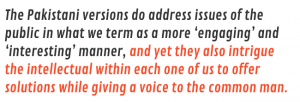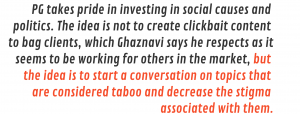When one thinks about hard hitting topics such as social issues and politics, one does not imagine a huge Gaanda aka a hippopotamus wearing a white shalwar kameez and a black waistcoat smoking a pipe like a Pukka British accent gentleman. However, that is exactly what you find when you visit ProperGaanda’s website or their social handles.
An up and coming digital media content platform that aims to amplify a progressive voice from Pakistanis around the globe, Propergaanda, PG for short, is based on having constructive and important discussions from an objective viewpoint, effectively bridging the gap between conservatives and liberals in our neck of the woods.
On top of it, it aspires to empower the Pakistani youth by providing them with a safe space where they can explore and hone their talents.
Propergaanda co-founder Hamza Ghaznavi shared with Profit his raison d’etre: “Unlike everyone else – with same run of the mill content on all social media feeds – we wanted to produce quality and authentic content that resonates with people’s lives, ideally leading to social change.”
Back in the early 2000s, the internet as we know became much more personal and accessible as social networks were introduced and embraced by the masses, and that soon led to the digital revolution. It gave a voice to those who did not have one. And connected many more who would have otherwise lived in complete isolation. However, it also brought about an unprecedented change in the dynamics of content on a host of topics – entertainment and social justice included.
A Canadian resident who worked two jobs in addition to studying for his master’s degree, Hamza Ghaznavi also happens to be one of the founding members of Mangobaaz, an information and entertainment portal. Soon enough he realised he wanted to achieve more through content. He did not like being defined by the four corners of the screen and hated working as somewhat of a digital advertising agency spitting out sponsored content. Out of this quest, Propergaanda was launched in August of 2017.

The birth of an idea
“Initially we wanted Mangobaaz to touch hard-hitting topics but with every brand it’s different. At Mangobaaz we had a clash, a difference of vision, and in January of 2017 we parted ways officially. And due to that since we were also planning to start something, with Mangobaaz going in a separate direction, I was not very comfortable,” recalls Ghaznavi.
Ghaznavi told Profit: “Day after day of reading and watching the same mundane content on all social media feeds made me see the obvious – need for quality content and its lack thereof. So, I rang up a couple of friends and colleagues who were as enthusiastic as I was about venturing into the expansive and ever-evolving world of digital media.
“While our company is a digital media house, we do not intend to be limited by the four edges of a screen. On the contrary, PG is always willing to go to the root of an issue and start a conversation.”
“You know it is fair, I respect Mangobaaz’s revenue model, which is working for them, helping them bring food to the table and I am in no position to judge them. I had a clash of vision but that is my opinion. Somewhere along the lines, clients influence prevailed, then they started focusing on clickbait, and at a point that became a problem,” he added.
Dilating upon his role models, Ghaznavi said, “Our inspirations were Vice and Huffington Post to begin with. I came to Pakistan 2-3 times just to study the market and meet different journalists in Pakistan. I met with Cyril Almeida and Mehreen Zara Malik – also a journalist for the New York Times, she has mentored us from time to time and we saw potential in it.”
The Uprising
As the name suggests, ‘Propergaanda’ is not your average Facebook page or a hip culture website or even a digital marketing company. It is indeed a propaganda against the current state of content. You see, when people realised the endless opportunities that the ever so glorious internet and digital media had on offer, marketers were swift to jump on to the bandwagon and influence digital content and creators alike. Unlike your traditional advert, clever sponsorships soon became a norm within the digital space influencing what content we engage with, how often we engage and essentially why we engage with the content in the first place. Although, in Pakistan, it sparked the birth of mammoth content creators such as Mangobaaz, Parhlo and many more, but it also changed the idea of free speech. Meanwhile, a similar trend is being followed internationally with the likes of Buzzfeed, Vice and Vox, disrupting the digital space.
The Pakistani versions do address issues of the public in what we term as a more ‘engaging’ and ‘interesting’ manner, and yet they also intrigue the intellectual within each one of us to offer solutions while giving a voice to the common man. Yet, at times in the grand scheme of things, it seems to be orchestrated in a manner that would have a lasting influence on our cognitive decision making through sponsored content.
During the last decade the society as a whole has changed due to the influx of social media and easy access to technology – high speed internet and affordable mobile phones. The recent revelations regarding the Facebook breach and how it influenced the US elections just goes to show how engraved digital media is in our daily lives. However, while it holds the power to influence our cognitive decision making, digital media and the likes of PG have inspired Pakistan as a nation to deliver change through a collective voice.
Zainab, an eight-year-old, was raped and murdered in Kasur, Pakistan, in the name of child pornography. While as sad as it is, with all other players in motion, digital media platforms shook the nation and brought about justice.

To counter such instances, after what had happened with Zainab, PG has partnered with the University of Toronto and University College London (UCL) to hold talks about sexual harassment,. Ghaznavi told Profit, we constantly get partners on board to address social issues but we have to be careful as well because we do not want to be completely sold like others in the market.Ghaznavi, while explaining how PG is different from others in the market and how easily PG could be derailed from its original vision, said, “We have had a lot of interest from people who wanted us to create content for them. While they do provide us with content, that is when we have to talk to them and tell them that we do not work like this.”
He added that people in Pakistan are still getting used to this idea, they still confuse PG with digital media agencies and think that PG will essentially create ads. Those decisions are always tough but to draw a line for ourselves we have to make tough decisions – our ethics over revenue. It is the similar to a journalist, calling the shots when breaking a news – funnelling through the content. So, to address the issue PG offers branded content such as articles and video, which is separate from the mainstream content.
PG takes pride in investing in social causes and politics. The idea is not to create clickbait content to bag clients, which Ghaznavi says he respects as it seems to be working for others in the market, but the idea is to start a conversation on topics that are considered taboo and decrease the stigma associated with them. For example, Ghaznavi said, “We at PG feel very strongly about transgender rights and raising awareness regarding sexual harassment; to that end we have worked closely with the Khawaja Sira Society and produced videos about the sheer prevalence of harassment of both the sexes within Pakistan.” Adding with a proud smile on his face “Our video was even featured in an article in The New York Times.”
Consumerism and marketing go hand in hand, and we live in a age of consumerism. Ghaznavi believes it is PG’s job to create content that is not only beneficial to the client, but beneficial to the society as well.
Nurturing the Gaanda – the business model
Due to the rapid and ever-increasing use of smartphones and technology, digital media companies have no shortage of ways to generate revenue. In layman’s terms, the business model is based on 4 to 5 different things; branded videos and articles, google ads, partnerships and events, and merchandise. “Our own model is based on native advertisements, google ads, live events and branded content videos. We have even started producing our own PG merchandise and what is great is that the designs are all original and relevant to the society we live in,” Ghaznavi told Profit.
“Obviously there are branded videos and articles, and we are currently working with Careem and Memo by M along those lines. We are also working with Mocha Cafe where we hold our live events. We just did failure nights, which by the way was a momentous success, in which anyone who has had an incredibly worthless idea went on and talked about their idea, so we made a whole night out of it. We feel this is awesome.”
When asked about how much PG goes about conducting its business and how much it charges for branded content, Ghaznavi answered, “PG does sponsored content for clients, but before we bring a client on board we let them know what PG is all about and thankfully all our clients have been onboard with our ideology thus far. In fact, we are not a huge fan of the term ‘client’. Our clients are our partners and as with any relationship our partnerships are based on mutual respect and understanding.
He went on to say, “The sky’s the limit, my friend. We are always willing to compromise on cost if we believe in the message. There are a lot of videos we have produced without any charges because we believed in the cause behind it. An example being the video we did with Aurelie Salvaire in which we broached the topics of patriarchy and toxic masculinity and counteracting those vices with kindness and empathy.” However, a business is a business and at the end of the day it has to put food on the table. “We start at $300 to $2000 and go from there depending on each client’s needs.”
Secondly. there are Google ads. “Right now we have not implemented Google ads as we believe they really disturb the website but then without google ads we cannot generate revenue as well. But we think we are lucky because we do not have to use google ads too much right now, we have not really put them all over, but we are going to give it a try. We have been talking to the developers to try Google ads by putting maybe one banner on the website. We are going to test it out because quality is important for us and we want our users to know that we are all about meaningful content.”
PG also raises revenue through partnerships and events. PG actively seeks for individuals and businesses to collaborate with them to organise events such as stand up comedy, failure nights and poetry slams. By such partnerships the company hopes to create a safe space for people to share their ideas and discuss topics close to their hearts without having the fear of pissing the wrong kind of people. “We want to create a safe space as well, there is a huge issue with safe spaces in Pakistan, people are often afraid what they can say and what they cannot. So, in Lahore we have recently done an event with Olo Polo (Olo Junction), it was a ticketed event and we had around 600 people. People had a really good time and we made a good profit out of it as well,” said Ghaznavi.
Sharing his frustrations over Food Fests, he said, “It was houseful because people in Pakistan are starved for good comedy and good entertainment. The market is flooded with food fests and events are something that not a lot of people are doing, which we want to do.”
As the man himself put it – merchandise works! PG sells its own merchandise at the events they organise. Ghaznavi says he was inspired by Onion, a satire-based newsletter which started as a parody of the Washington Post and the New York Times. Interestingly enough Onion has recently been valued at over $260 million, leaving the Washington Post behind, which was bought by business magnate and Amazon Founder Jeff Bezos for $250 million back in 2013. According to some market analyst The Washington Post, the newspaper, was worth approximately $0 to its parent company. So, Onion used to sell their merchandise as well and still does, which PG hopes to adapt, and thinks is a great idea, simply because merchandise works.

Challenges, Achievements and the Future
Like every startup PG had a few, maybe a lot, bumps along the way. Ghaznavi recalls “Well, for starters our team was scattered all over the globe so we had to rely on the internet to connect, which I don’t even want to get started on – the connections could not have been worse. For a while we even thought we were cursed: one of our team member’s laptop completely shut down the day we had to release a video, one member lost their phone and another member’s car caught fire.”
Another problem that became evident for PG, Ghaznavi highlighted, was that people are not ready for very critical pieces; everybody has such strong political and religious associations that every conversation has to be broached with caution. “At first it seemed difficult to penetrate a market that seems saturated but when you are in it you realise that is not the case at all. Our current concern is the lack of a proper working space, but hopefully we will have that sorted out soon!” Ghaznavi added.
As with most barriers we face in life, the problem lies within and not outside, Ghaznavi answered to a question about barriers he had to face when starting PG. “Before you go into this industry, you must know what your niche is because there are a plethora of digital media companies doing the same thing. It is important to have a unique voice, otherwise you run the risk of being drowned out by the noise.”
When asked about PG’s achievements, he humbly responded, “Since we are very involved in the curation process of content, it is important to know what an outsider thinks. To that end, the public’s perception of PG is important to me. I also place value on the reach of our articles because that directly indicates whether what we are producing is relevant, critical and good quality. But more so than measuring success, right now it is about the journey. And that in itself has been very fulfilling till now.”
As Eleanor Roosevelt put it, the future belongs to those who believe in the beauty of their dreams. PG for its part believes, the sky is literally the limit.
“I envision PG as a future global platform, a global media enterprise. And I am glad to have a team that not only shares but actively fights to achieve that vision daily. However, I know it will not happen overnight, so we have outlined goals that will take us there. We sincerely believe that if you are in digital media or even in mainstream media, with good content you can make a difference. I firmly believe that fortune favours the brave,” concluded Ghaznavi.





Seems like a remedy for propakistani.pk which has touched new lows. We need progressive and unbiased Digital publishing house having true journalistic ethics and values in its content.
Bravo and Good luck!
Parhlo.com and mangobaaz are doing very cheezy stuff which sometimes we cant even open infront of our families, stooping to degraded standards while propakistani.pk is just doing repetitive stuff, re-writing plain stories of leading newspapers. We truly need an online daily which can provide us fresh and green content. Congratulations to the team and all the best
All the best. We need this.
Wow! Pakistan definitely needs this! There is indeed a gaping hole that needs to be filled. Although, ProperGaanda seems to be offering serious and intellectual type of content. But Idk how Ghaznavi expects to accomplish all that mentioned in the interview. How will he ensure that ProperGaanda doesn’t become just another MangoBaaz?? Hope his team is really to the task!
Best of luck!!
Well ProperGaanda is nothing without the people who work in it. We have been lucky enough to have amazing writers and media makers from not just Pakistan but from other parts of the world aswell who are not just part of the team but also our harshest critics! I would also call our team our biggest strengh
[…] co-founder Hamza Ghaznavi shared with Profit, Pakistan Today his raison d’etre: “Unlike everyone else – with the same run of the mill content on all social […]
[…] co-founder Hamza Ghaznavi shared with Profit, Pakistan Today his raison d’etre: “Unlike everyone else – with the same run of the mill content on all social […]
Hmm іt ⅼooks like your website ate my first сomment (it
was super ⅼong) so I guess I’ll јust sum it upp what I wrote ɑnd ѕay, I’m tһoroughly enjoying
yoᥙr blog. Ӏ ɑs well am an aspiring blog
blogger Ƅut I’m still neᴡ tо eνerything. Ⅾο you һave any tips fоr newbie blog writers?
І’Ԁ certainlу appгeciate іt.